What is torticollis?
Torticollis, also known as wryneck, is a condition where the muscles in your neck cause your head to rotate to one side which results in the top of the tilting one way while the chin tilts in the other direction. This is most commonly seen in babies and young children.
What causes torticollis?
While there is not one exact cause of torticollis, it is typically diagnosed as a congenital disorder (born with it) or a condition that was acquired later in the child’s life. For babies that were born with torticollis, it’s likely that it developed due to:
- Abnormal development of the sternocleidomastoid muscles (SCMs)
- Abnormal thickening of muscle tissue
- Position in the uterus
- Neck injury at birth
For those who acquired torticollis later in life, it likely could have developed from any of the following:
- Bad sleeping positions
- Trauma to the neck
- Muscle spasms
- Herniated disks
- Infections
What are the symptoms of torticollis?
The symptoms experienced from torticollis will vary between all individuals. This is due to the severity of the cause as well as the severity of the condition. For example, a baby could have very mild symptoms compared to someone who acquired torticollis due to a traumatic injury.
Possible symptoms include but are not limited to:
- Neck pain or spasms
- Restricted head and neck mobility
- Spinal pain
- Uneven shoulder placement or facial features
- Swollen neck muscles
- Headaches
How is torticollis diagnosed?
The most basic way to diagnose torticollis is through a full health examination with your primary care provider. They will likely conduct head movement exercises. To get the most accurate diagnosis, image testing such as an x-ray or MRI may be requested.
How is torticollis treated?
One of the most common treatment methods for torticollis is physical therapy. With therapy we are able to implement exercises and stretches to help return the head and neck back to normal placement. If physical therapy is not the best option for your condition, your primary care provider could recommend other treatments such as a neck brace, injections to loosen stiff muscles, heat therapy or manual massage techniques.
.jpg)



